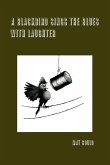Karenin Sings the Blues is a meditation sparked by the actors in Tolstoy's 19th-century masterpiece, Anna Karenina. Entering this famous saga of derailed love, McCartney explores the repercussions and unintended consequences of Anna and Vronsky's passion. Here, Anna Karenina's cuckolded husband "sings the blues," but Count Vronsky, too, bemoans his disappointed expectations. McCartney imagines the anxieties of Anna's children, the self-absorption of busybodies and in-laws, the ambivalence of servants and friends sucked into Anna's romantic vortex. Set at the height of the industrial age, the roar of the train and the pounding rhythm and flying soot of the steam locomotive epitomize the vigour of McCartney's poems. The same vigour and clear vision characterize the "California" poems, which deal with McCartney's youth in urban southern California. Domestic chaos amid cultural inanity creates turmoil and fear. How is it possible to love a distant mother, a father off somewhere with a third or fourth wife, a wounded and angry brother, a terminally ill sister consuming everything? How is it possible not to? How can an adolescent know the difference between self-preservation and self-destruction? These concerns continue into adulthood and motherhood in "Persuasion," the third section of Karenin Sings the Blues. Accessible and always forthright, McCartney combines plain-speaking revelations about family and domestic life with literary criticism and witty cultural play.
Hinweis: Dieser Artikel kann nur an eine deutsche Lieferadresse ausgeliefert werden.
Hinweis: Dieser Artikel kann nur an eine deutsche Lieferadresse ausgeliefert werden.








